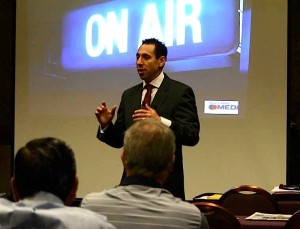In today’s digital age, media training is an essential tool that can help individuals and

Jess Todtfeld during a Media Training Workshop
businesses effectively communicate their message to the world. Whether it’s a press conference, an interview, or a presentation, media training provides valuable techniques and strategies to communicate with confidence and professionalism. This comprehensive guide will take you through the fundamentals of media training, its benefits, and how you can leverage it to your advantage.
Understanding Media Training
Media training is a type of coaching that teaches individuals and businesses how to effectively communicate with the media. This training can help you to prepare for media appearances, interviews, or press conferences, and enables you to deliver your message in a clear, concise, and impactful manner.
Benefits of Media Training
The benefits of media training are numerous. First and foremost, it allows you to be prepared for media appearances, interviews, or press conferences. Media training helps you to communicate in a clear, concise, and effective manner, which is essential when dealing with the media. It enables you to stay focused and deliver your message in a way that is engaging and memorable.
Media training also helps to build your confidence when dealing with the media. It provides you with the necessary skills to answer difficult questions and handle tricky situations with ease. It helps you to avoid common mistakes and pitfalls that can harm your reputation or message.
Key Elements of Media Training
Media training involves several key elements that are designed to help you become a more effective communicator. These elements include:
- Message development: One of the most critical aspects of media training is developing a clear and concise message that you want to communicate to the media. This message should be tailored to your audience, and should highlight your key points in a way that is easy to understand.
- Delivery: Once you have developed your message, the next step is to deliver it effectively. This involves using appropriate body language, tone of voice, and pace to ensure that your message is engaging and memorable.
- Handling difficult questions: Inevitably, you will face difficult questions during a media appearance or interview. Media training helps you to anticipate these questions and develop effective responses that allow you to stay on message.
- Crisis management: Media training also prepares you for crisis situations, such as negative publicity or an unexpected event. It teaches you how to respond quickly and effectively to mitigate any damage to your reputation or message.
Leveraging Media Training for Success
Media training is a powerful tool that can help you to achieve your goals, whether it’s building your personal brand, promoting a new product, or raising awareness about an important issue. By following these tips, you can leverage media training to your advantage:
- Understand your audience: Before any media appearance or interview, it’s crucial to understand your audience. This allows you to tailor your message to their interests and concerns, and ensures that your message is relevant and engaging.
- Prepare in advance: Preparation is key to success when it comes to media training. Take the time to develop your message, anticipate difficult questions, and practice your delivery in advance.
- Be authentic: While it’s essential to be prepared and professional during a media appearance, it’s also important to be authentic. People respond to honesty and transparency, so be yourself and let your personality shine through.
- Continuously improve: Like any skill, effective communication requires practice and ongoing improvement. Continuously seek feedback, analyze your performance, and work to improve your communication skills over time.
Media training is a valuable tool that can help you to communicate more effectively with the media, and ultimately, achieve your goals.
By understanding the fundamentals of media training, its benefits, and key elements, you can leverage this tool to your advantage and become a more.
